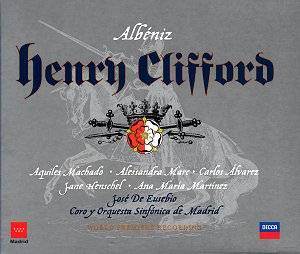It
has come as a remarkable surprise to find that in the late nineteenth
century, British Romantic Opera was alive and well, safe in the
hand of the Spanish composer Isaac Albéniz, then living
in London. A couple of years ago (January 2001) I reviewed Albéniz’s
slightly later (1906) opera Merlin, which came as a complete
surprise, a re-writing of a page of musical history: not only
that the music existed at all, but how worthwhile was its revival.
Now we have his forgotten Wars of the Roses opera Henry Clifford,
his first full-scale operatic score (there was also an operetta,
not yet on CD), written between 1893 and 1895. What comes as the
greatest surprise after another discovery from the same collaboration
is how consistently musically strong they are – constantly gripping
material and memorable tunes. If we did not know better we might
suspect these operas were written in white heat of inspiration,
rather than representing an impecunious Spanish composer away
from home responding to the well-funded if misplaced artistic
ambitions of his wealthy patron and librettist, banker Francis
Burdett Money-Coutts. Money-Coutts’s objective was nothing less
than establishing a Wagnerian English national opera. He was unsuccessful,
largely because the structure of his libretti contained nothing
new, and because his language has dated so badly. (‘O Mother,
why didst thou deny my longing for the fray’; ‘let the plighted
troth like a ring enfold you both’ or ‘Shall loyalty to phantom
right our yearning heart estrange?’ are prime examples.) Fascinating,
too, that within a very few years another moneyed would-be operatic
pioneer, Lord Howard de Walden (writing as T.E. Ellis), funded
Joseph Holbrooke in a similar enterprise, which also failed over
the libretti, in that case a convoluted re-telling of Welsh mythology.
I
have found this Albéniz English opera another worthwhile
discovery – and if you responded positively to the CDs of Merlin
by the same team, you are going to love this operatic re-telling
of a slice of English history. When the future of the record industry
seemed to be falling increasingly into the hands of the independent
labels it is heart-warming to know that we can still find an unknown
opera issued by Decca with all the high production values we traditionally
associate with that company name. For me, this is what recorded
music is all about: worthwhile unknown repertoire given tremendous
impact by a dedicated team that seems to believe in it and with
packaging that is second to none. The 146-page booklet is a work
of scholarship in itself, with libretto in four languages and
historical essays. Indeed the only slight problem is the one we
had with Merlin: it seems impossible to get hold of a vocal
score which I like to have by me when listening to unknown recorded
opera (if any reader knows the solution to this do please let
me know).
There
is very little evidence here of the more familiar later Albéniz,
and, if you did not know, you would be hard-put to identify the
composer; yet for sparkling melody, dramatic sweep and orchestral
colour, it is a fine example of an unknown turn-of-the-century
opera, very much of its time. Although Albéniz was going
for a Wagnerian historical canvas the many set numbers, especially
in the first two acts, make it easy to explore on CD. The third
act is more through-composed but even here Decca’s seventeen entry
points identify the plums. Altogether the Decca team have given
us a total of 48 access points, so as soon as one finds favourite
moments they are easy to return to. There are, inevitably, occasionally
naff moments. Unfortunately for me one of these comes towards
the end of Act III, when in a vigorous quartet ‘For fear of pain
flee not the right’, a slightly rum-ti-tum rhythm evokes the ghost
of a vigorous Edward German which re-emerges in the final chorus,
making the opera end as more of a period piece than I had expected.
The
solo team are not familiar to me, but they all contribute strongly
in clear English, though with just occasionally the shadow of
a too correct pronunciation. Three of the earlier team return.
The mezzo Jane Henschel, who made such a success of Morgan-le-fay
in Merlin, is heard again, now as Lady Saint John, while
two other leading members of that cast also reappear - the baritone
Carlos Álvarez, Merlin last time is now Lord Saint John,
and soprano Ana María Martínez, previously Nivian,
now sings Annie Saint John. The chorus are virile and compelling
and the orchestral contribution by the Madrid Symphony Orchestra
confident and powerful and indeed only the children’s choir near
the beginning even remotely gave one reservations. Recommended
for explorers, for dipping, and for good conservatoire opera courses
looking for a vivid unfamiliar score to get their teeth into.
Lewis
Foreman
